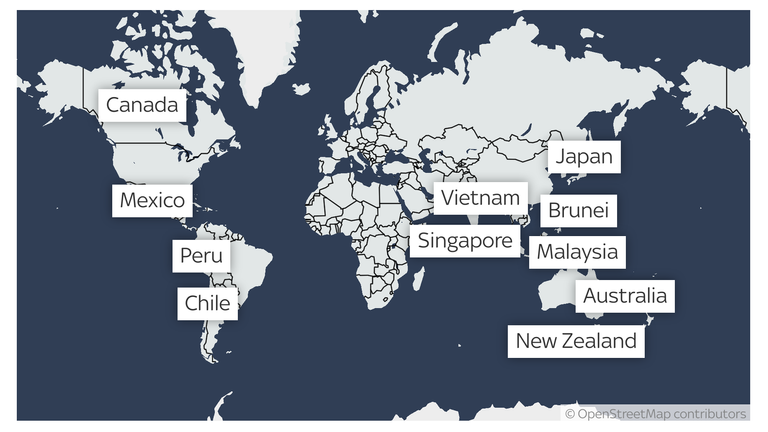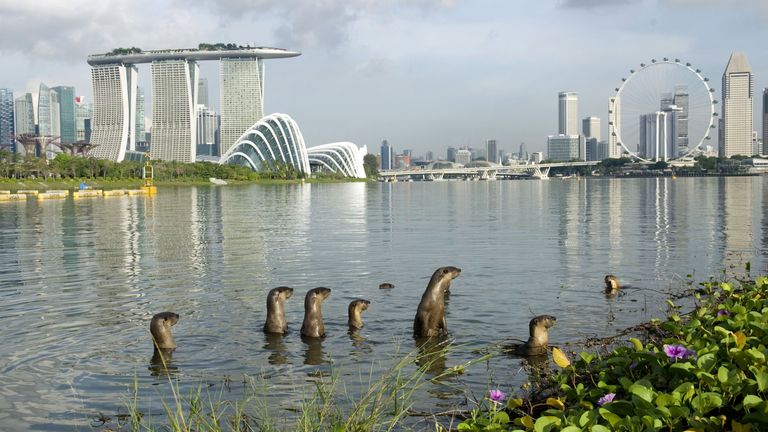CPTPP: UK accepted into Indo-Pacific trade bloc in biggest trade deal since Brexit
Prime Minister Rishi Sunak claims joining the 11-strong trade area will "demonstrate the real economic benefits of our post-Brexit freedoms".
Friday 31 March 2023 17:39, UK
The UK has been accepted into an Indo-Pacific trade bloc in what the government says is its biggest trade deal since Brexit.
The Comprehensive and Progressive Agreement for Trans-Pacific Partnership (CPTPP) is a free trade agreement between 11 countries across the Indo-Pacific, including Australia, Brunei, Canada, Chile, Japan, Malaysia, Mexico, New Zealand, Peru, Singapore and Vietnam - and now the UK.
The partnership sees the countries open up their markets to one another, reducing trade barriers and tariffs, with the hope of bolstering the economies of its members.
Sunak hails UK joining CPTPP - live politics updates
Trade Secretary Kemi Badenoch said the UK's accession to the CPTPP was formally confirmed in a telephone call between her and counterparts from the group at 1am BST on Friday.
The UK is the first European country to enter the agreement, and the government claims it will lead to a £1.8bn boost to the economy "in the long run".
Prime Minister Rishi Sunak said the deal shows "what we can achieve when we unleash the benefits of Brexit".
But his predecessor, Liz Truss, called on the government to use its membership to block China from joining.
Releasing a statement, the former PM said: "The CPTPP is a vital economic bulwark against China and in due course I would like to see other like-minded free-trading nations making their own applications to join.
"It is essential, however, that any idea of Chinese accession is ruled out and I would expect the British government now or in the future to oppose any such proposal."
While the UK already has trade agreements with most of the CPTPP members, apart from Malaysia, UK officials said it would deepen existing arrangements, with 99% of UK goods exported to the bloc now eligible for zero tariffs.
This includes cheese, cars, chocolate, machinery, gin and whisky, while Downing Street said the services industry would also enjoy "reduced red tape and greater access to growing Pacific markets".
The deal has been praised by a number of business groups, including the Confederation of British Industry (CBI), Standard Chartered bank and the world's second-largest wine and spirits seller Pernod Ricard.
But other trade experts have warned it will not make up for the economic hit caused by leaving the European Union.
Chancellor Jeremy Hunt said joining the CPTPP is a "massive opportunity" for British exporters and shows "our influence in this part of the world is becoming more significant".
Ms Badenoch told Sky News the difference between being part of the CPTPP and the EU is "we make the rules and regulations on our standards".
She promised the deal is "not going to displace farmers in the UK" and said it will provide more competition for EU countries so "people don't have to buy what they don't want".
Ms Badenoch admitted the lower tariffs will apply to palm oil, which is responsible for destroying orangutan habitats, but said you "have to make trade-offs" when doing a deal and said the UK currently buys 1% of Malaysia's exports and "moving to 2% from 1% is not what is going to cause deforestation."
She claimed the UK will have "more influence" on sustainability as part of the bloc - despite Greenpeace calling the deal "outrageous".
"Palm oil is actually a great product, it's in so many of the things we use," she added.
"This is not some illegal substance we're talking about and actually there are other crops in the EU that are causing deforestation that fit within EU rules."
How much is the deal really worth?
The UK began negotiations to join the bloc in September 2021 when Boris Johnson was in Downing Street.
The signatory countries of the CPTPP are home to 500 million people and the government claims the deal will be worth £11 trillion in GDP, accounting for 15% of global GDP.
However, critics said the impact will be limited, with official estimates suggesting it will add just £1.8bn a year to the UK economy after 10 years, representing less than 1% of UK GDP.
Mr Sunak said the agreement "puts the UK at the centre of a dynamic and growing group of Pacific economies".
"We are at our heart an open and free-trading nation, and this deal demonstrates the real economic benefits of our post-Brexit freedoms," he added.
"As part of CPTPP, the UK is now in a prime position in the global economy to seize opportunities for new jobs, growth and innovation."
More politics:
Starmer 'prepared to be ruthless' to win election
Labour's top second jobs earner says he'll 'live with' any ban
'Real milestone for British industry'
The announcement was welcomed by business group the CBI which called it "a real milestone for the UK and for British industry".
Interim general director Matthew Fell said: "Not only does the agreement provide greater access to a group of fast growth economies representing 14% of global GDP and over 500 million consumers, but membership reinforces the UK's commitment to building partnerships in an increasingly fragmented world.
"CPTPP countries and business need to work together to future-proof the rules-based trading system and stimulate growth with a focus on digital, services and resilient supply chains."
Labour leader Sir Keir Starmer welcomed the trade pact but warned the "yield is very small", saying the net contribution to the UK economy "will be something in the order of 0.08%".
"I do think it's an important trade deal, but the yield is very small. Hopefully that will grow over time," he said.
"But the rule in trade is that you're more likely to trade with your nearer neighbours more and more often, so we do need that improved, that better trading relationship with the EU alongside any other trade deals that we sign."
'EU should be priority'
The Institute of Directors said it was "vital the UK signs trade deals to restore our international reputation since Brexit".
But it added "complete reorientation" to the Indo-Pacific would not solve "the very real problem that businesses currently face - namely that they have many more trade related challenges than they did six years ago".
"From our surveys, directors have told us that the EU-UK relationship is a priority issue the government needs to address in order to support business," they said.
"UK companies still rely on the long-established links they have with EU markets, which are directly on our doorstep and with whom they have closer historical ties.
"The Indo-Pacific strategy will open up important opportunities for UK businesses, but the government must not forfeit the significance of our relationship with the EU in order to do so."



